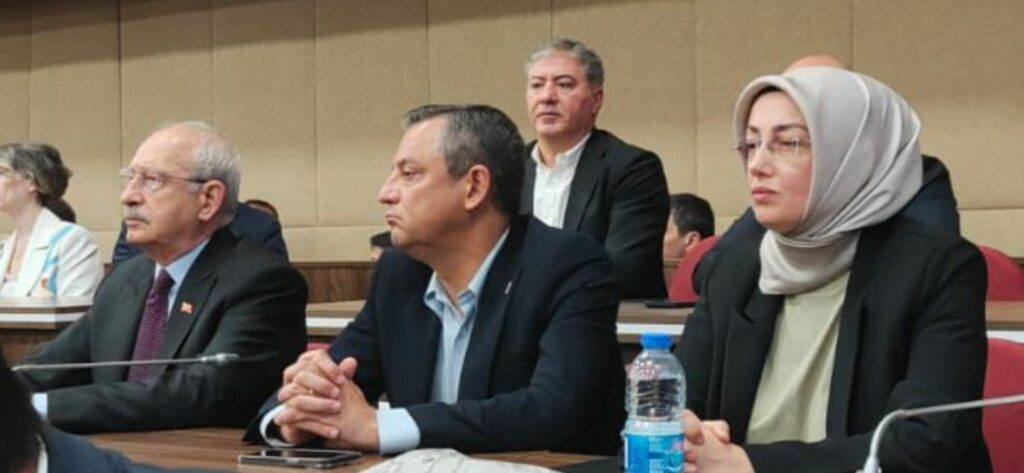An Ankara court on Monday began the trial of 22 suspects accused of the premeditated murder of Sinan Ateş, an academic and former leader of the Grey Wolves (Ülkü Ocakları), the youth wing of the far-right Nationalist Movement Party (MHP), who was killed in 2022, the Medyascope news website reported.
The 38-year-old Ateş was fatally shot in Ankara on December 30, 2022. His murder in broad daylight sent shockwaves across the country, sparking a debate about the power struggles within the country’s nationalists.
Monday’s hearing was attended by Ateş’s widow, Ayşe Ateş, who has been actively seeking justice for her husband, in addition to politicians Özgür Özel, leader of the main opposition Republican People’s Party (CHP); the party’s former chairman Kemal Kılıçdaroğlu; nationalist opposition İYİ (Good) Party leader Müsavat Dervişoğlu; Victory Party (ZP) leader Ümit Özdağ; and some other opposition politicians.
Erinç Sağkan, president of the Union of Turkish Bar Associations, and several other provincial bar association chairmen also attended the hearing at the Ankara 32nd High Criminal Court.
Ayşe Ateş, who last month made a desperate plea to Interior Minister Ali Yerlikaya and Justice Minister Yılmaz Tunç for protection, fearing for her life and that of her children due to overt threats, came to the hearing wearing a bulletproof vest.
In the indictment, 22 people, including Doğukan Çep, who is accused of instigating the murder; Eray Özyağcı, who is accused of firing the fatal shots; and Emre Yüksel, a private secretary for the current Grey Wolves president, are accused of “premeditated murder.”
In his defense Özyağcı said he only shot Ateş in the feet as a warning, adding that he had no intention of killing him.
While admitting he ordered Özyağcı to shoot Ateş in the feet, Çep also said he had no intention of having the former Grey Wolves leader murdered and was “shocked” to find out about his death.
Çep said he had made a deal with Ateş to help him get rid of a court case against him and paid him some money to carry it out but was no longer able to reach Ateş and thus decided to have him shot in the feet for not keeping his promise.
It is common in Turkey, which has a poor record on the rule of law, for influential political figures to intervene in court cases and influence the judges in favor of or against a defendant.
Medyascope said the lawyers weren’t allowed to ask any questions about former MHP deputy Olcay Kılavuz, who is a suspect in the case but not included in the indictment because he had parliamentary immunity at the time, during the hearing on Monday.
Kılavuz previously claimed that he was instructed to remain silent, said he was ready to testify and requested the release of all wiretapped conversations between him and the suspects. Although he did not specify who asked him to keep quiet, it was likely MHP leader Devlet Bahçeli. Observers claimed that Kılavuz’s move was a bid to stop Bahçeli from throwing him under the bus.
Commenting on the defendants’ statements, Ayşe Ateş on Monday said in a tweet, “It seems that the roots of this political murder are deeper than we thought.”
The indictment, which fails to address the alleged masterminds or the motive behind the assassination, focusing instead on those who were directly involved in the execution of the crime, prompted fierce criticism from Ayşe Ateş and people following the case.
The widow’s criticism of the indictment highlights a broader accusation of government interference and a possible coverup, suggesting that the indictment was intentionally stripped of details to protect certain political figures.
The court unanimously rejected a request by lawyers representing the MHP to be a co-plaintiff in the trial.
The hearings are expected to last for five days, according to Medyascope.
This case is being followed by the opposition particularly closely due to the suspects’ political affiliations and the historical importance of the Grey Wolves as an unofficial paramilitary wing of the MHP. Their ideology is mainly based on Turkish nationalism. Therefore, Kurds, Armenians and other minorities in Turkey have occasionally been their targets.
In 2020 France officially banned the Grey Wolves after a center dedicated to the memory of those who died in the mass killings of Armenians during World War I was defaced with graffiti, including the name of the Grey Wolves.
The German government has faced an intensified public campaign in favor of banning the Turkish nationalist group since then.
In 2021 the European Parliament called on the European Union and its member states to examine the possibility of adding the Grey Wolves to the EU terrorist list.
In its 2019-2020 report prepared by Turkey rapporteur Nacho Sanchez Amor, the EP voiced concerns about the group, saying it was expanding to worrying levels not only in Turkey but also in EU countries.

